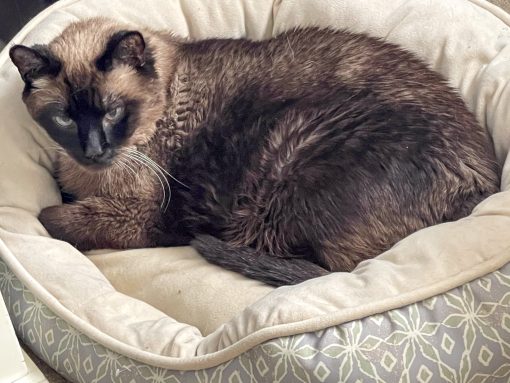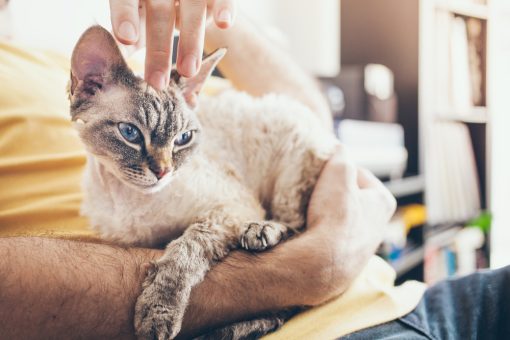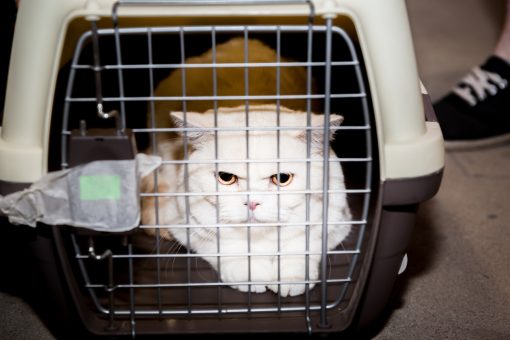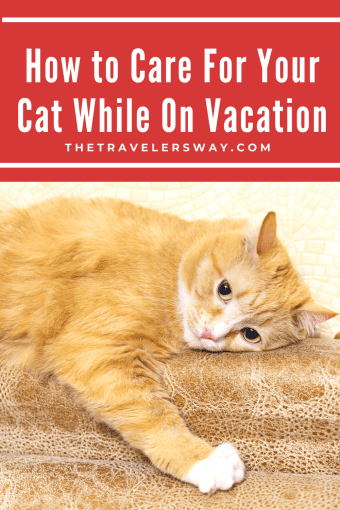When it comes to traveling, cat owners often face the dilemma of how to ensure pets are safe, comfortable, and cared for in their absence. There are plenty of pet care options geared toward dogs, but relatively fewer options are available for cats. So what are traveling cat parents to do?
In this guide, you’ll learn how to care for your cat while on vacation.

Our aim is to provide a comprehensive overview of how to make sure your cat is well cared for while you travel. Read on to learn more about how to arrange care for your cat when you are away, so that you can have peace of mind knowing that your feline friend is safe and happy even though you can’t be there with them.
- Plan Your Cat Care Ahead of Time
- Leaving Your Cat Home Alone
- Hiring a Pet Sitter
- In-Home Cat Sitters
- What To Discuss With Your Pet Sitter
- Boarding Your Cat
- Enlisting Help from Friends or Family
- Preparing for Leaving Your Cat at Home
- Returning Home to Your Cat
- Final Thoughts On Cat Care Options for Travellers
- About the Author
- For Pinterest
Plan Your Cat Care Ahead of Time
When preparing for your trip and figuring out what to do with your furry friend, first consider how long you’ll be away. There is no one-size-fits-all solution to cat care, and what may be the best option for a short trip away might not be the same as when you gone for an extended amount of time.
There are essentially three options to choose from: leave your cat at home alone (not recommended in most situations), have someone come and take care of your cat in your home, and find care for your cat outside of your home. Knowing what your options are ahead of time will help make planning your cat care easier when the need arises.
Once you have decided on what type of care will work best for your cat, done your research, and settled on a caregiver, be sure to book well ahead of time. Good pet sitters and boarding facilities often book up weeks or months in advance, and you don’t want your travel plans to be ruined by the lack of cat care.
Leaving Your Cat Home Alone
If you’re only going to be away for a day or two, leaving your cat at home might be an acceptable option. This really depends on the individual cat.
For example, this may be a good option for cats that are very independent or have other cats for company. On the other hand, this is not a good idea for an older cat with health problems, or cats that are closely bonded with their owners and who will experience loneliness and separation anxiety if left alone for even a few extra hours.
It is never advisable to leave a cat alone for an extended period of time, such as a week or more, without having someone come in to check and care for them daily. Even the most independent cat can experience severe stress and trauma from this. Being left alone for such a long time undoubtedly feels like abandonment.
If you are leaving cats alone for just a day or two, make sure to leave enough food and fresh water out for them – and extra, just to be certain. You may want to consider using an automatic pet feeder if your cat is one of those who likes to overeat. Make sure their favorite toys are left out for them, and consider leaving a radio or television playing at low volume so that they don’t feel so alone.

Whenever possible, still try to arrange for someone to check in on them at least once a day to make sure all is well and spend some time with them.
Hiring a Pet Sitter
A professional cat sitter is an individual who specializes in providing care for cats when their owners are away. They know how to take care of a cat, and provide services such as feeding, cleaning litter boxes, grooming, administering any necessary medication, and offering companionship and playtime.
The sitter may either visit the cat’s home at specific times or stay overnight, depending on the arrangement. Professional cat sitters are typically experienced in handling a variety of cat breeds and behaviors, and many are trained to respond to emergencies.
11 Benefits of Hiring a Professional Pet Sitter
Hiring a professional pet sitter is not only convenient but there are other benefits as well that you might not immediately think of.
Here are 11 benefits of hiring a professional pet sitter:
- Personalized Care: Pet sitters provide one-on-one attention to your cat, tailoring their care to your cat’s specific needs, routines, and preferences. A live-in pet sitter will provide your cat with far more companionship than most other options do.
- Playtime: Pet sitters can provide stimulating playtime for cats of all ages, helping keep them active and engaged.
- Reduced Stress Levels: Cats often feel less stressed when they remain in their familiar environment. Pet sitters can visit your home, reducing the disruption to your cat’s daily routine.
- Medication Administration: If your cat requires medication, a professional pet sitter can administer it accurately and on schedule.
- Monitoring Health: A professional sitter can monitor your cat’s health while you’re away, alerting you to any changes or concerns.
- Home Security: Having someone visit your home regularly can deter burglars and maintain the appearance of an occupied house.
- Minimal Exposure to Disease: Cats are less likely to be exposed to illnesses from other animals that they might encounter in a boarding facility.
- Consistency: Maintaining a consistent feeding and playtime schedule can help reduce anxiety for your cat.
- No Transportation Stress: You won’t need to transport your cat to and from a boarding facility, which can be stressful for both you and your pet.
- Daily Updates: Many professional pet sitters offer updates and photos to keep you informed about your cat’s well-being, providing peace of mind while you’re away.
- Emergency Preparedness: In case of emergencies, professional pet sitters are trained to handle various situations and can act quickly to ensure your cat’s safety and well-being.
Knowing that your cat is left with professional care in a comfortable and familiar environment can help you enjoy your vacation with peace of mind knowing that your pet is in capable hands.
Finding a Reliable Pet Sitter to Care for Your Cat
Finding the right pet sitter for your feline companion can be daunting, but it doesn’t have to be if you know where to start.
Start by asking for recommendations from friends, family, or local veterinarians who may know reputable pet sitters in your area.
You can also explore online platforms like Pet Sitters International, the National Association of Professional Pet Sitters, and Wag! that connect pet owners with professional sitters. Be sure to read reviews and check references.

Look for someone who is knowledgeable about animals, has good reviews from other clients, and makes you feel confident that they will take good care of your cat. When you identify potential candidates, conduct interviews to discuss their experience, services offered, insurance and bonding, and how they handle emergencies.
Once you’ve narrowed down your options, schedule a visit with the pet sitter in your home so that you can get a feel for how they interact with animals.
Finally, trust your gut: at the end of the day, it’s important to trust your judgment and intuition when selecting a pet sitter. You should feel comfortable with the person or facility you ultimately select.
In-Home Cat Sitters
In-home cat sitters, like professional pet sitters, specialize in caring for cats. The main difference is that rather than the sitter coming to your home, you bring your cat to theirs.
The main advantage of using an in-home cat sitter is that instead of just checking in on your cat once or twice a day the sitter provides around the clock supervision. This option is particularly useful if you’re uncomfortable with someone entering your home while you’re away.
Just like cat sitters that come to your house, it’s important to thoroughly vet any in-home sitters to ensure they are reputable and reliable. Visit their home ahead of time to make sure that your cat is going to be kept in a safe, clean, and comfortable environment.
However, this option is not suitable for all cats. Some cats may not adjust well to a new environment, potentially causing additional stress. In-home sitters also tend to have limited availability compared to professional pet sitters who can cater to multiple clients at once.
What To Discuss With Your Pet Sitter
Whether your cat will be cared for in your home or theirs, make sure to have a clear and thorough discussion with your pet sitter about your cat’s needs. Providing the sitter with a written list of instructions as well will help make sure nothing is forgotten.
Some key topics to cover include:
- Feeding Schedule: Detail when and how much you feed your cat, as well as any dietary restrictions or preferences.
- Medical Needs: If your cat requires medication, provide detailed instructions on dosage and administration schedules.
- Emergency Contact Information: Leave your contact information, as well as the contact information for a trusted friend or family member in case of an emergency.
- Veterinarian Contact Information: Provide the name and phone number of your cat’s veterinarian, as well as any relevant medical history or current health concerns.
- Behavioral Issues: Inform your pet sitter of any behavioral issues your cat may have, such as scratching furniture or not using the litter box.
- Playtime and Exercise: Discuss any specific playtime routines or activities that your cat enjoys.
If the cat is being cared for in your home, you will also want to make sure that you show them where everything is in your house such as where you keep the food and treats, where the litter box is, etc.
Boarding Your Cat
Cat boarding facilities offer both advantages and disadvantages for pet owners. On the positive side, these facilities typically provide close supervision of your cat in a controlled environment, with trained staff capable of administering medications and handling emergencies.

Some cats may benefit from social interaction with other felines in these settings, and the environments are designed with security in mind to prevent escapes. Boarding facilities often offer supervised playtime and activities to keep cats mentally and physically engaged, and some provide 24/7 care and monitoring for added peace of mind.
However, there are drawbacks to consider. Cats can find unfamiliar surroundings and the presence of other cats stressful, potentially leading to anxiety and behavioral issues.
There’s also a risk of disease transmission in boarding facilities, as cats may come into contact with diseases from other animals despite stringent health protocols.
Limited space can be a concern, especially in standard cages. This might not be a concern for overnight stays, but it might not provide enough room for some cats to maintain normal activity levels over several days or more.
Additionally, the cost of boarding can be high, particularly if you opt for extra services or a private enclosure, and boarding facilities often have set hours for drop-off and pick-up, which may not align with your travel plans.
Boarding kennels are not a good choice for cats that are older, sick, or have a history of separation anxiety. In these situations, it may be best to consider other options where the cat can be cared for in its own home. Alternatively, your veterinary clinic might provide medical boarding services for pets with special needs, so be sure to check with them.
Choosing the right boarding facility
Start your search for a good pet boarding facility by conducting thorough research. Look for facilities with a good reputation, preferably with positive reviews from pet owners who have used their services.
Visit the facility in person to assess cleanliness, safety, and overall comfort for the cats. Ask about staff qualifications and training, ensuring they have experience with feline care and can handle emergencies.
Consider the facility’s accommodations. Some cats may prefer private enclosures, while others may enjoy communal play areas. Ensure that the facility follows strict health protocols to minimize the risk of disease transmission.
Inquire about the daily routine, including feeding schedules, playtime, and interaction with staff. Discuss any special requirements your cat may have, such as dietary needs or medication administration, and confirm that the facility can accommodate these.
If you have any doubts about a facility, continue your search until you find one that aligns with your cat’s needs and your expectations.
Preparing your cat for boarding
Prior to your departure date, start packing for your cat’s boarding stay as well as your own trip.
Pack familiar items like a blanket or bed for your cat to sleep on, your cat’s toys, and a piece of your clothing with your scent to comfort them during their stay. These items will provide a sense of security and familiarity.
Make sure to pack an ample supply of their usual food as well. Suddenly switching to new food can result in upset stomachs and diarrhea, making the boarding experience even more stressful for your cat.
If your cat is on medication, make sure to pack enough for the duration of their stay. Provide detailed instructions and dosages to the facility staff to ensure proper administration.
Schedule a vet visit before boarding your cat to ensure they are up-to-date on vaccinations and have no underlying health issues that could affect their stay at the facility. Reputable facilities will require proof of vaccination before taking your cat into their care.
If your cat isn’t used to a cat carrier, spend time acclimating them to it before boarding to reduce stress during travel. Label your cat’s carrier, food, and belongings with their name and your contact information.
Finally, try to maintain a sense of calm and routine leading up to the boarding date, as your cat can pick up on your stress and anxiety. When dropping off your cat, maintain a calm and positive demeanor to minimize their anxiety.
Enlisting Help from Friends or Family
Enlisting the help of friends or family members to care for your cat while you’re away can be an excellent option, provided that they are reliable and genuinely care for your pet.
One of the biggest advantages of having a friend or family member take care of your cat is the bond and trust they already have with your pet. This can help reduce your cat’s stress while you’re away since they’re familiar with the person.

It also means your cat can stay in the comfort of their own home, keeping their routine intact. Plus, it’s usually a more affordable option compared to professional pet sitters or boarding facilities.
Just as for other types of cat sitters, you will need to provide detailed care instructions including information about their daily routine, feeding schedule, and medication schedules.
Make sure they know the locations of essential items like food, treats, toys, and the litter box. Consider leaving emergency funds in case they need to restock cat food, treats, or litter while you are away.
Additionally, establish a communication schedule for regular updates through text messages, photos, or videos, helping you stay informed about your cat’s condition and any potential issues.
Expressing gratitude to your friend or family member is also important. Showing appreciation for their assistance with a thank-you note or a small gift upon your return reinforces the relationship and encourages continued excellent care.
Preparing for Leaving Your Cat at Home
Whether you have a house sitter staying in or a pet sitter dropping by during the day, your cat is likely going to be upset or bored while you are gone. This can cause cats to start acting out, and this makes them much more likely to get into mischief.
Although you very likely have already cat-proofed your house to some extent, now is a good time to be extra cautious. Try to look at your cat’s environment from their perspective and address any potential issues or hazards that could happen while you are gone.
As an example, plants that your cat usually leaves alone are a prime target when they are bored. Cupboard doors, dresser drawers, and any other cabinets with low handles are all areas that a bored cat might be able to get into.
If you can find a way to secure it, do so. Make sure doors are closed to areas where you don’t want the cat to get into, make sure trash cans are emptied, and remove any objects that might pose a choking hazard.
Additionally, provide plenty of entertainment and enrichment activities. This can include interactive toys such as cat tunnels, scratching posts, and puzzle feeders to keep them busy. This will help them stay active while giving them something else to focus on besides being anxious or bored.
Leave the curtains or blinds open so they can watch activities outside the window and feel connected to their environment. Leaving a TV or radio on can also help provide some background noise and distraction. There are also apps specifically designed for cats that help keep them engaged and entertained.
Set up feeding areas with durable, non-tip bowls for food and water in an easy-to-access location. Include detailed instructions for any caregivers about portion sizes, feeding times, and dietary restrictions if your cat follows a specific feeding routine or requires medication.
When it is time to leave, avoid making a big deal out of it. Just leave calmly and quietly to minimize their anxiety.
Returning Home to Your Cat
Unlike dogs who are over-the-moon happy to see you when you return from a trip, cats can have a much different response. While some may greet you enthusiastically, others are just as likely to show their displeasure either in their attitude or their behavior. It may take a bit of time for them to “forgive” you for leaving them behind.
When you come back home to your cat after a trip, a gradual reintroduction to your regular schedule will help minimize stress. Take extra time to spend quality moments with them, reassuring them of your presence and helping them feel secure in their environment.

Keep an eye out for any changes in your cat’s behavior or health. Cats may react differently to your absence, so watch out for signs of anxiety, aloofness, or excitement. Pay attention to any changes in litter box habits or unusual behaviors and consult a veterinarian promptly if you have any concerns.
To rebuild your bond, try engaging in some gentle affection and playtime while keeping up with a consistent routine. Just remember, some cats may need a bit more time to readjust and fully reconnect with you.
Final Thoughts On Cat Care Options for Travellers
Leaving your cat at home can be a challenge, but with proper planning and preparation, you can make sure they are well cared for while you’re away.
There are now various options available for cat care while you are away, from pet sitters and house sitters to home-based boarding services and more. Doing your research and finding a reliable option that works for you and your cat can help make the process of leaving them at home less stressful.
Remember, every cat is unique, and as a cat parent, you understand their individual needs better than anyone else. Establishing a safe and secure environment for your cat while you’re away is essential, so take the time to consider their needs and make any necessary arrangements.
By prioritizing your cat’s comfort, safety, and happiness, you can travel with peace of mind, knowing that your feline friend is well cared for in your absence.
Happy travels!
About the Author
Dr Wendy Wilkins, DVM, PhD, is a seasoned veterinarian and epidemiologist, boasting 25+ years across clinical practice, research, academia, and regulatory veterinary realms. She is also the editor and a content creator for Cat BYTES, a website committed to making sure pet owners get the information they need in a way that is factual, accessible, and easy to understand.
For Pinterest
Save to your favorite Pinterest boards!


You might also enjoy
The Travelers Way occasionally accepts guest posts from fellow travel bloggers, friends within the travel industry, and as advertorial content.







